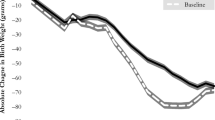Abstract.
This paper utilizes quantile-regression techniques in order to estimate the effects of demographics and maternal behavior during pregnancy at various quantiles of the birthweight distribution. Due to the high costs and long-term effects (both medical and economic) associated with low-birthweight babies, there is a great deal of interest in quantifying these effects, particularly at the lower end of the birthweight distribution. Using large samples of 1992 and 1996 births in the United States, the quantile-regression estimates indicate that several factors (including race, education, and prenatal care) have a significantly higher impact at lower quantiles and lower impact at higher quantiles. These effects at lower quantiles are underestimated by least-squares regression estimates. The inequality in birthweights implied by these results is quite significant, and there is little indication that the inequality has changed much in recent years.
Similar content being viewed by others
Author information
Authors and Affiliations
Rights and permissions
About this article
Cite this article
Abrevaya, J. The effects of demographics and maternal behavior on the distribution of birth outcomes. Empirical Economics 26, 247–257 (2001). https://doi.org/10.1007/s001810000052
Issue Date:
DOI: https://doi.org/10.1007/s001810000052



